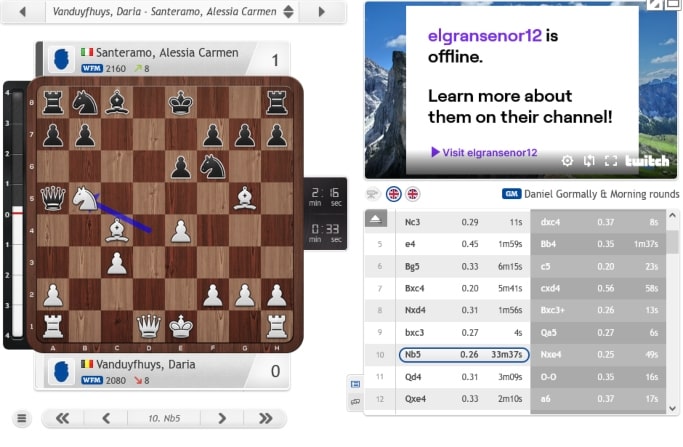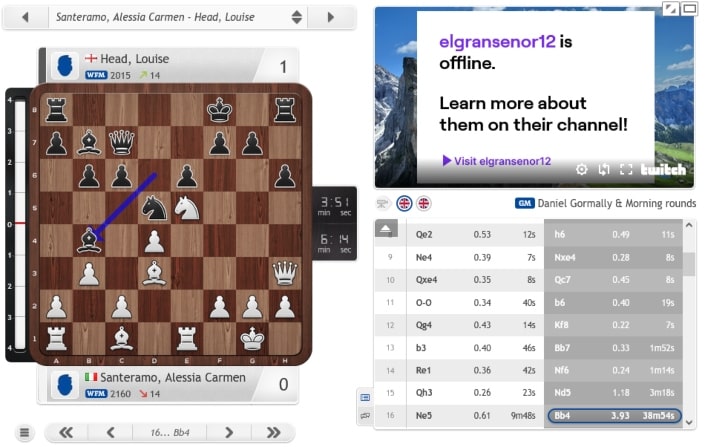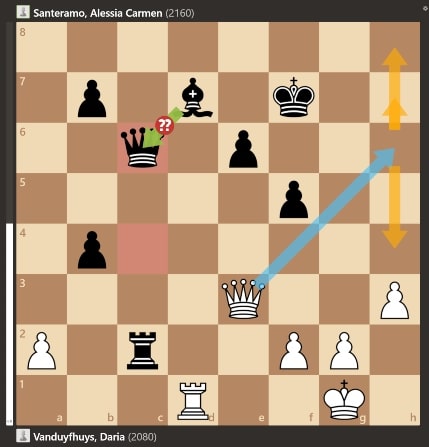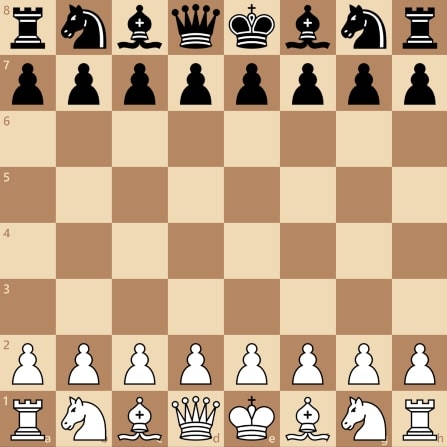This is a guest article by my amazing girlfriend WFM Alessia Santeramo. She writes about her recent experience at a closed OTB Classical Chess Tournament. Check Alessia out on her Twitch & YouTube and leave her a follow :-).
Enjoy!
Finally, I’ve played my first OTB tournament after 2,5 years of just playing online chess. I’ve been in London for 5 days and played a closed 9-rounds tournament with the possibility to score a WIM norm if I would have scored 6.5/9.
SPOILER ALERT: I’ve scored no norm; with 5.5 points I was 1 point away from it.
In any case, I bring a lot with me home after this experience. I’ve learned so much and I’ve collected some important tips that I believe can be extremely useful for your next tournament. Or if you plan to play your first OTB tournament in the future. I have selected 8 typical mistakes that my opponents or I have done and provided you better alternatives.
I hope you enjoy reading my first article!
MISTAKE #1 Expressing Lack Of Confidence When Making Moves
Many chess players tend to do the following when making a move:
1. They take a piece and move it to a square without leaving it
2. They keep holding it while trying to check if they missed something in their calculation
3. They get stressed by the opponent staring at them and they go back with the piece to the starting square and keep thinking about where to move it.
Even if this attitude might not make you blunder or lose directly, I think is a big problem. It shows a lack of confidence and a confused thinking process.
Second-guessing your own decision has many problems:
- Consumes way too much time
- Gives your opponent time to think on your clock about your probable move
- Increases confidence of the opponent just by the fact that you are unsure about your own moves
My suggestion: When making a move, just do it!
Take your time to think about your next move but once you took the decision, go for it! Trust yourself, don’t second guess. And if me saying this is not enough, let me quote the World Champion Magnus Carlsen. In an interview about how to be a peak performer he said:
“It’s better to trust your gut and be burned sometimes than to always second-guess yourself.”
Chess World Champion, GM Magnus Carlsen
MISTAKE #2 Thinking Too Much For One Move.
When playing OTB, you have a scoresheet where you must notate the game. Next to each move, I like to always keep track of my and of my opponent’s time. I can tell you, I’ve seen huge mistakes in the matter of time management at my recent tournament.
The biggest is definitely thinking too much for one single move. The right way to manage your time during a chess game is to spend more time on a few critical moments and to take fast and practical decisions for the other moves.
Even in a critical moment, you should try not to think for more than 20 minutes. If you need more time for a move, it signalizes that something is wrong either in the way you think or in your understanding of the position.
In round 4, my opponent thought for 6mins at move 6, 6 mins at move 7, and 33 minutes at move 10!! So, while I had still 1:30 on the clock, she had 45 minutes.

In any case, the first prize for the longest time spent on a move was from my opponent in round 3: she used 39 minutes at move 16.

The result of the games is not too significant as I won round 4 but lost round 3. Results aside, both my opponent were in time trouble at a very early stage of the game. If you spend so much time on one move, you will end up having to make many more moves on time trouble.
And we all know, time trouble is a blunder party!
My Suggestion: Keep Track Of Your Time
As a general rule, try not to invest more than 20 minutes for a move, even in a critical moment. If it happens that you are already thinking for 20 minutes about a move, give yourself just 5 more minutes to find a logical decision.
During these extra 5 minutes, look again at the position in a logical way, pick the move that seems the best to you, watch out for all the easy tactics that your opponent might have and if it’s all good just go for it!
MISTAKE #3 Blitzing When The Opponent Is In Time Trouble
This is what I’m struggling with the most. When my opponent is short on time, I tend to get nervous.
I don’t want to give them time to think about their next move on my time because I think that if they have to take a decision in a few seconds they will blunder. At game 3, my opponent had very little time starting from move 20(!).
At one point, I took some time to calculate a long tactical variation. My opponent (with 1 minute on the clock) replied with a move that seemed senseless to me (giving away a pawn just to delay the tactical combination).
It was an unexpected move. But instead of taking some time, I quickly took the pawn carelessly. Only to realize a few moves later that at the end of the combination not having the pawn allows my opponent a trick that wins a piece and the game!
It was not hard to see and if I would have invested 2 minutes, I would have seen it. This is how your opponent’s time trouble can backfire.
My Suggestion:
The big question is “How to use the extra time in the right way?”
A GM gave me this great tip: it’s smart to play react very fast just if your next move is forced or if you calculated in advance how to react to your opponent’s move. If a move is unexpected, you need to stop and think! Don’t repeat my mistake, it cost me a full point and potentially a norm!
Let’s not forget that even if our opponents get some time to think about the position during our time, they never really know what move we are going to play next.
Small input from Noël: I see many mistakes of amateurs & professionals when the opponent is low on time. It somehow triggers the worst in us.
Just wanted to share this great advice I got from my first Coach, GM Artur Yusupov. He told me:
“Either try to win on position or on time. Mixing both never works”.
GM Artur Yusupov, former World #3
MISTAKE #4: Playing On Under 2 Minutes
Credit for this goes directly to Noël. Before the tournament, he gave me lots of tips about the tournament (you can check out our YouTube Video) and this was one about time management: never go under 2 minutes.
It’s very important because when you start to be short on time, you start to think in an irrational way. More time is used to panic and check compulsively the clock rather than to think rationally about your next best move.
During my recent tournament, I went just twice under 2 minutes, and guess what… 2 big blunders happened! At game 4 vs WFM Vanduyfhuys, I might have drawn a completely winning position after 40…Qc6??

I’ve played this move with just 6 seconds on the clock. The problem is that now the queen doesn’t control anymore the square on h4 and after 41.Qh6 there is no way to avoid the perpetual with Qh8+/Qh4+
MISTAKE #5 Preparing without using the online games
In the past few years, chess was played nearly exclusively online. When you prepare to play against your opponent (also for an OTB game), you must check what they play online.
In game 4, my opponent was completely surprised about my opening choice, and she used over 45 minutes to make the first 10 moves! I had actually never played that opening in any OTB tournament before, but I’ve played 231(!!!) recent online games with it! She would have saved so much energy and time if she would have checked it!
It is easy to look at your opponent’s online games thanks to OpeningTree, it’s really great. Insert your opponent’s lichess/chess.com username, and the website creates an opening tree of all their games. You can even download the games and check them on ChessBase if you prefer.
The best of it? The website is completely free! On the other hand, I suggest you have an anonymous online account where you practice the openings you are going to play OTB. Like this. It will be much harder for your opponents to prepare against you and you’ll have much bigger chances to surprise them!
If you want to know better how to prepare against an opponent, you can check out Noël’s article on it. He also is a fan of OpeningTree :-).
MISTAKE #6 Assuming to remember your Preparation
For my recent tournament, I had prepared all the games in advance before the tournament thanks to the precious help of IM Alex Banzea. He gave me a database with all the different opening files that I had to check before every game. What I did in the first few rounds was just to check the files a couple of times until I felt like I knew it!
What happened when I was actually playing?
OMG at the board I was so confused between the different lines and some I couldn’t remember at all. In both games 2 and 3, I had the right move on the opening preparation file, but I played the wrong move at the board as I couldn’t remember.
After all that work, this felt like a big waste!
So how can you really remember your opening preparation?
After failing twice in rounds 2 & 3, I’ve made a change. After studying a file, I’ve opened a new empty board and I’ve tried to recreate it all again! Believe me, that was such a difference. It helped me understand what was clear and what was not. As I trained it actively at home, I remembered the small differences between the lines and felt much better at the board!
Until the end of the tournament I haven’t had anymore any problem remembering my preparation and this felt amazing (and gave me some extra confidence!).

MISTAKE #7 Not playing until the end
When I was younger, I had huge problems with the fear of losing! I’ve made so many draws in endgames where I still had a slight edge just because I was too scared to keep playing.
Luckily, now that my main interest is in streaming chess on Twitch, I feel much freer at the board and I play every game until the very end. This allows me to learn so much faster, even if sometimes I might lose a game!
On the other hand, keeping playing could also bring a win 😉
In any case, the goal of any tournament should be to learn as much as possible. Thinking about ratings, norms and tournament placement is such a short-term mindset. In the long run, you’ll improve the most if you try to use every game as a chance of improving. Big mistakes are part of the journey.
I wish I would have applied this earlier in my chess journey…
MISTAKE #8 Fear Of Taking Risks At The Board
Sorry for stressing this point but I feel it is very important. Fear, fear & fear is our biggest enemy in chess, and I’ve experienced it a lot. Our society is so result-based that there is a huge risk in playing chess while being afraid of losing. Sadly, most of the time this fear is holding us back from taking risks at the board.
This attitude has 2 big problems. If we always go for the safest choice, we risk wasting a good advantage and winning might become super hard. Additionally, never going for a very tactical and potentially dangerous position hinders our possibility to progress in that area.
Dynamic, tactical chess is just way too important chess, and the best way of learning to master such complex positions is by playing them. You can fail, yes, but you learn 10 times more from playing a complex position than studying it from a book.
The more you do it, the more experienced you’ll become and the more comfortable you will feel at the board.
To wrap up, here are my eight tips for your next OTB Chess Tournament:
- Don’t second-guess yourself. Once you took a decision about a move, go for it!
- Manage your time effectively and try not to spend more than 20 minutes on a move
- When your opponent is in time trouble, use your extra time to reply effectively to unexpected moves
- About time management, try never going under 2 minutes. Below 2 minutes, we think more about the clock rather than our next move.
- Don’t forget to check your opponent’s online games to prepare.
- Make sure to REALLY remember your opening preparation. Use my tip and test yourself on an empty board or a physical board.
- Play every game until the end! Endgames are hard. The more you play them, the better you’ll become at it!
- Don’t exclude a very sharp and tactical continuation for fear of losing.
Thank you very much for reading up to this point, I appreciate your time.